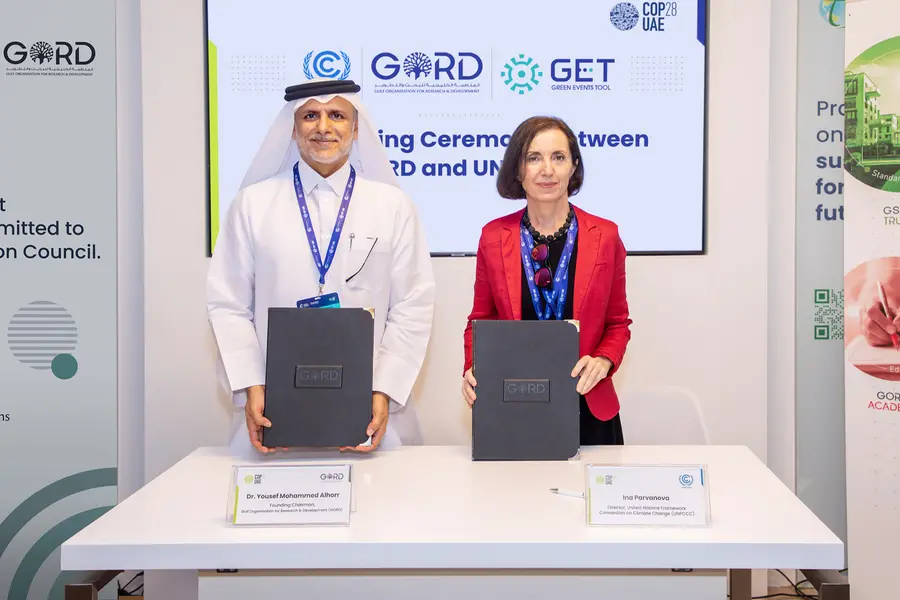PHOTO
Dubai, UAE — In a bid to enhance environmental performance of global events and meetings, the Gulf Organisation for Research & Development (GORD) has formally extended and deepened its strategic collaboration with the United Nations Framework Convention on Climate Change (UNFCCC) secretariat. The official agreement, inked at the ongoing 28th United Nations Climate Change Conference (COP28) in Dubai, focuses on the ongoing development, maintenance and operations of the innovative Green Events Tool (GET) jointly launched by UNFCCC, United Nations Environmental Program (UNEP) and GORD in 2021. Signing the recent agreement on behalf of GORD was its Founding Chairman, Dr. Yousef Alhorr, while UNFCCC secretariat’s senior leadership was represented by Director of Communications and Engagement, Ina Parvanova.
Building upon the foundation laid by the Memorandum of Understanding signed on 24 October 2018, the renewed collaboration which will be effective until 31 December 2026, seeks to enhance the ongoing research and development to enable successful implementation of the Green Events Tool (GET). The primary focus remains on pushing the environmental sustainability of events, conferences and meetings, particularly by addressing their climate impact through mitigation measures as well as offsetting of unavoidable greenhouse gas (GHG) emissions through verified climate contributions and funding for impactful climate action initiatives.
Addressing the audience at the agreement signing event, Dr. Yousef Alhorr, Founding Chairman of the Gulf Organisation for Research & Development (GORD), said, “Every day, across the globe, thousands of large-scale events become catalysts for collaboration, cultural exchange and mutual development. Yet, in their wake, they also imprint an irreversible mark through their carbon emissions. The idea of developing the Green Events Tool (GET) was rooted in our shared vision of introducing a holistic framework that could assess and improve the environmental performance of events at every stage. As we continue this journey, our commitment remains unyielding. We persistently explore avenues to enhance GET, ensuring it evolves to its fullest potential. In this endeavor, we are honored to collaborate with the UNFCCC secretariat and UNEP."
The MOU signing ceremony was followed by insightful sessions that delved into a detailed overview of the tool, covering its objectives, features, components and its value proposition to the value chain of the low carbon pathway. Furthermore, the organic growth journey of the GET was shared, providing insights into its current status, key features and upcoming initiatives aimed at enhancing user experience, interface and outreach. One of these sessions covered a case study featuring a major tennis sporting event in the Middle East that utilized GET, showcasing the tool’s accuracy, efficiency and practical application.
GET, first unveiled during the 26th United Nations Climate Change Conference (COP26) in November 2021, and later complemented by the inauguration of its web portal in September 2022 just before COP27, has emerged as a pioneering tool to address the climate impact of the events industry. At its core, GET serves as a catalyst for proactive measures aimed at mitigating the negative impacts of events, particularly their carbon footprint. This involves detailed documentation of activities influencing sustainability and GHG emissions, precise calculation of GHG emissions (carbon footprint), and transparent reporting of the calculated carbon footprint and corresponding sustainability actions. An optional yet encouraged third-party verification process ensures a sustainability rating, along with a recommendation to employ high-quality carbon credits to offset unavoidable GHG emissions.
GET’s comprehensive web portal has been a result of a meticulously process-centric and transparent approach. While the planning and development spanned years of rigorous research and effort, GET's intrinsic value lies in its capacity to simplify the intricate processes required to assess and enhance the sustainability profiles of various events. As COP28 unfolds, UNFCCC secretariat, UNEP and GORD anticipate amplifying the tool's reach to create a positive change towards greener, more sustainable events on a global scale.
About GORD:
The Gulf Organisation for Research & Development (GORD) is an RDI entity recognized among leading organizations in the global sustainability milieu. Headquartered in Qatar Science and Technology Park, GORD drives the transformation of societies, industries, and the built environment by influencing corporate ethos, fostering innovation, and developing capacity to enable low-carbon sustainable growth for present and future generations. The organization’s key operations include R&D, standards setting, green buildings certification, accreditation services, voluntary carbon markets, performance testing, knowledge dissemination and advisory services on sustainability and climate change for governments, non-government, public and private sector organizations in line with Qatar National Vision 2030 and United Nations Sustainable Development Goals (SDGs).
For more information, contact:
Hussam Othmany
Manager, Marketing & Corporate Communications
Email: h.othmany@gord.qa
Farwa Zahra
Head of Content
Email: f.zahra@gord.qa




















